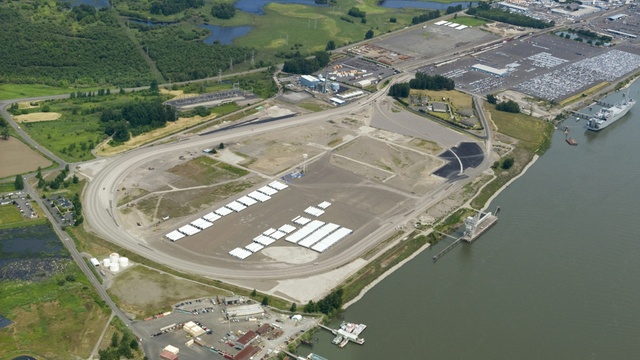EFSEC stresses Tesoro-Savage plan not a done deal
By Aaron Corvin, The Columbian, July 15, 2014
The site where Tesoro Corp. and Savage Companies want to build the Northwest’s largest oil-by-rail terminal in Vancouver is appropriately zoned for such a purpose, the state panel reviewing the proposal decided Tuesday.
But that doesn’t mean the companies will be allowed to launch a rail-and-river operation handling as much as 380,000 barrels of crude per day at the Port of Vancouver, according to the state Energy Facility Site Evaluation Council.
During its regular public meeting in Olympia that was accessible by telephone, the evaluation council voted 8 to 1 to settle what it described as a very narrow question: Does the city’s heavy industrial zone at the port allow for such uses as the oil transfer terminal proposed by Tesoro and Savage?
And while the evaluation council answered “yes,” it also went to great lengths to point out that the question of whether the companies should actually get to build and operate their project is far from settled.
Approval of a narrow land-use consistency matter “does not, by any means, translate into an approval of the proposed project,” Bill Lynch, chairman of the evaluation council, said Tuesday.
The council’s decision was unfavorable to the city of Vancouver. The city had asked the council to put off deciding the land-use consistency issue until the analysis of the oil terminal’s environmental impacts is finished. Bryan Snodgrass, principal planner for the city who was appointed to serve on the evaluation council during the review of the Tesoro-Savage proposal, cast the lone “no” vote Tuesday.
At the same time, the evaluation council’s decision enables the companies to take another small step forward in a slow, grinding environmental-impact review process that looks like it will stretch on further.
Although state law says the evaluation council has one year to make its recommendation on a large energy-project proposal — and gives Gov. Jay Inslee another 60 days to accept, reject or send the proposal back to the council — the law also provides for extensions.
During the hearing, Sonia Bumpus, a specialist for the evaluation council, said the Tesoro-Savage permit application, filed in late August, is nearing its one-year anniversary. A lot more work needs to be done, she said, so more time will be needed.
Language added
The evaluation council also agreed to put language in its land-use consistency approval making it clear that people may still raise numerous concerns about the proposed oil terminal, including everything from potential oil spills and fire risks to negative impacts on neighborhoods and city services.
The language was included in response to remarks by Snodgrass, who said he had concerns with an “unqualified” finding that the Tesoro-Savage proposal fits the city’s zoning rules. Other evaluation council members agreed, saying the zoning approval should be construed narrowly and not taken as a dismissal of environmental-impact and community concerns.
The council’s decision followed a May 28 hearing during which it heard arguments over the land-use consistency issue.
Jay Derr, an attorney for Tesoro and Savage, had argued the land-use issue was a housekeeping matter. The evaluation council should allow the companies and the public to move immediately onto the project’s environmental impact statement, he said.
The city argued otherwise, saying the oil terminal doesn’t automatically comply with the city’s land-use rules and policies. It’s not possible for the city or the evaluation council to decide the land-use matter “without knowing the full extent” of the project’s environmental impacts, Bronson Potter, city attorney for Vancouver, said.
Although the Tesoro-Savage proposal moved forward Tuesday, it still has a long way to go.
The evaluation council’s decision-making process is complex, involving multiple permit reviews, a detailed environmental-impact analysis, many opportunities for public comments and an adjudicative process where arguments fly in an atmosphere not unlike that of a trial court.
The city of Vancouver, which opposes the oil terminal, could still ask the evaluation council to reconsider signing off on the oil terminal’s compatibility with city zoning, in light of the draft environmental impact statement.
And it could present other evidence against the Tesoro-Savage proposal during hearings. Likewise, the companies will be able to push back, presenting their own arguments and evidence.
The evaluation council will eventually make a recommendation to Inslee, who has the final say. Even then, opponents could still appeal the governor’s decision to the state Supreme Court.


